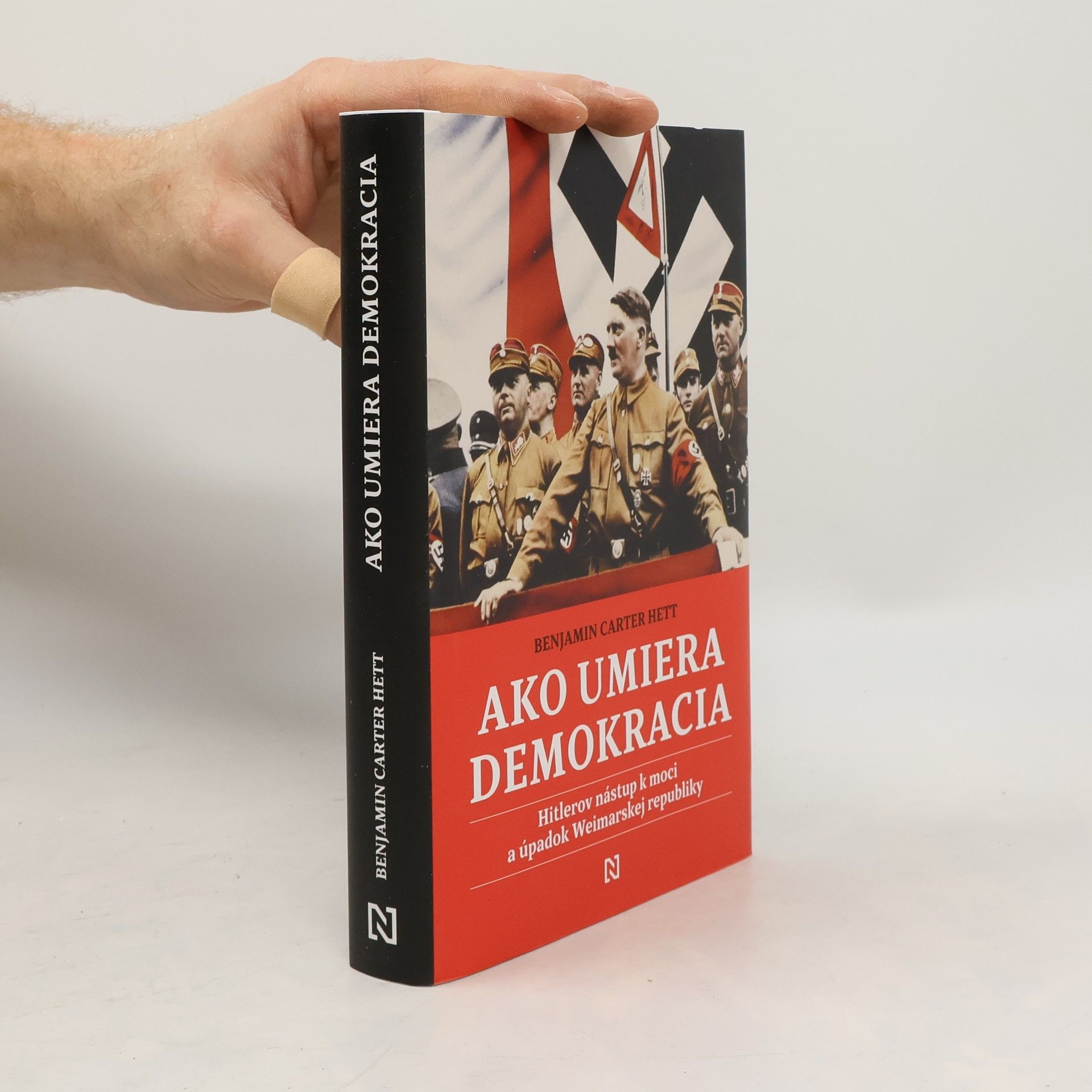Dangerous Traits of Narcissists
- 88pages
- 4 heures de lecture
Do you need to know how to disarm the narcissist in your life?...... What are you waiting for? BUY IT NOW and let your customers get addicted to this amazing book!
Benjamin Carter Hett est un historien qui explore les aspects les plus sombres de la nature humaine et de l'instabilité politique. Son travail examine les complexités du passé, révélant des parallèles troublants avec le présent. Le style analytique de Hett et sa capacité à relier des événements historiques à des préoccupations modernes rendent son écriture captivante et provocatrice. Ses livres invitent les lecteurs à réfléchir aux défis persistants de la justice et du pouvoir.






Do you need to know how to disarm the narcissist in your life?...... What are you waiting for? BUY IT NOW and let your customers get addicted to this amazing book!
»Anfang 1939 gab es kaum Zweifel, dass es in Europa Krieg geben würde – und zwar bald. Weniger klar war hingegen, wer gegen wen kämpfen würde.« November 1937: Adolf Hitlers politischen Gegenspielern wird die zunehmende Bedrohung durch das NS-Regime bewusst. In den Hinterzimmern der Macht treffen Staatsmänner in Berlin, London, Washington und Moskau weitreichende Entscheidungen, die letztlich zum Ausbruch des Zweiten Weltkriegs führen und seinen Verlauf maßgeblich vorzeichnen. Benjamin Carter Hett, der bisher unerschlossene Quellen durchforstet hat, zeichnet genau nach, welche Ereignisse, Gespräche und Begegnungen dem Kriegsausbruch vorausgingen und wie die Angst vor dem Konflikt die westlichen Demokratien vor eine Zerreißprobe stellte. Dabei kommt er den handelnden Figuren sehr nahe und erhellt nicht nur die diplomatischen Gefechte und Strategien der Staatschefs, sondern widmet sich auch zahlreichen weniger bekannten politischen Akteuren. Ein Blick hinter die Kulissen der Weltpolitik während der größten Krise des 20. Jahrhunderts.
Panoramatické rozprávanie o rokoch predchádzajúcich druhú svetovú vojnu príbeh krízy demokracie, rasových konfliktov a príliš pomalého rozoznávania zla dokáže hlboko zarezonovať aj v našej dobe. Berlín november 1937. Adolf Hitler sa stretáva so svojimi vojenskými veliteľmi, aby im sugestívne podsunul naliehavú potrebu vyvolať výbojnú vojnu smerom do východnej Európy. Führerov grandiózny plán niektorých generálov znervózni, no potenciálni odporcovia jeden po druhom zmĺknu, vďaka čomu sa dajú do pohybu udalosti, ktoré vyvrcholia najkrvavejšou vojnou v histórii. Benjamin Carter Hett nás zavedie do zákulisia Berlína, Londýna, Moskvy a Washingtonu a priblíži nám čoraz odvážnejšie provokácie nemeckého diktátora na pozadí bezradnej politiky demokratických lídrov. Autor mapuje protinacistické sily v Nemecku i mimo neho po dlhej a tŕnistej ceste k pochopeniu skutočného rozsahu Hitlerovej hrozby pre európsku civilizáciu, ktorá len pomaly nadobúdala schopnosť otvorene mu čeliť. Ponúka pritom detailné portréty vlád zažívajúcich krušné chvíle a postáv, ktoré sa zúfalo snažili zvrátiť udalosti vo svoj prospech. Hett tu, rovnako ako v knihe Ako umiera demokracia, uznávanej analýze pádu Weimarskej republiky, čerpá z pôvodných zdrojov a aktuálne sprístupnených dokumentov, pričom ukazuje, že tieto dávne konflikty v našej dobe až prekvapivo rezonujú. Vnímať Nacistickú hrozbu znamená dívať sa na minulosť a prítomnosť v novom, znepokojivom svetle.
Prečo bol rozklad demokracie v Nemecku tridsiatych rokov taký rýchly a taký absolútny? Ako mohla demokratická vláda dopustiť, aby sa Adolf Hitler dostal k moci? V strhujúcej správe o zlyhaniach hlavných predstaviteľov Weimarskej republiky a náraste vplyvu nacistov, ponúka Hett odpovede na tieto a ďalšie otázky. Tvrdenie, že Hitler sa dostal k moci vďaka demokratickým voľbám, realitu príliš zjednodušuje. Zložitá politická a ekonomická situácia viedli k záplave demonštrácií a vedúce osobnosti nemeckej politiky sa jeho popularitu rozhodli využiť vo svoj prospech. Tento pokus ich nakoniec zahnal do slepej uličky, z ktorej viedla len jediná cesta prizvať nacistov do vlády. Hett ukazuje, ako sa konzervatívni politici mýlili, keď sa domnievali, že Hitler a jeho prívrženci ich budú slepo podporovať. Namiesto toho, aby si uvedomili, že ich snaha využiť nacistov, vlastne hrá Hitlerovi do karát, ochotne mu do rúk odovzdali nástroje, ktorými Nemecko premenil na hrozivú diktatúru.
A panoramic narrative of the years leading up to the Second World War - a tale of democratic crisis, racial conflict, and a belated recognition of evil, with profound resonance for our own time.
In the 1930s, Germany was at a turning point, with many looking to the Nazi phenomenon as part of widespread resentment towards cosmopolitan liberal democracy and capitalism. This was a global situation that pushed Germany to embrace authoritarianism, nationalism and economic self-sufficiency, kick-starting a revolution founded on new media technologies, and the formidable political and self-promotional skills of its leader. Based on award-winning research and recently discovered archival material, "The Death of Democracy" is a panoramic new survey of one of the most important periods in modern history, and a book with a resounding message for the world today.